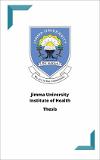IPHC-E Repository System
Experimental evaluation of the use of biochar from human feces: Nexus approach towards waste-energy and soil management
- Home
- →
- Universities
- →
- Jimma University, Institute of Health
- →
- JU Theses and Dissertations
- →
- View Item
JavaScript is disabled for your browser. Some features of this site may not work without it.
| dc.contributor.author | Regassa, Wakagari | |
| dc.date.accessioned | 2021-04-19T07:59:14Z | |
| dc.date.available | 2021-04-19T07:59:14Z | |
| dc.date.issued | 2015-01-30 | |
| dc.identifier.uri | http://repository.iifphc.org/handle/123456789/1241 | |
| dc.identifier.uri | https://repository.ju.edu.et/handle/123456789/2875 | |
| dc.description.abstract | Nutrient and Energy trapped in household biodegradable solid waste and wastewater has to be recycled to meet the escalating energy demand and lack of urban sanitation in developing countries. Human feces in developing countries like Ethiopia area major causes of environmental pollution and community health impairment, particularly in slum areas where many people live together under low basic sanitation coverage. Hitherto, the management option involves a simply containment, treatment and disposal which is practiced in most cities of developing countries. Human waste recycling with appropriate and low cost technologies can prevent environmental contamination and protects public health. In addition, such approaches have great importance to recover energy and develop natural fertilizer from feces. However, such human waste management options are not yet explore efficiently. This article presents results of a study evaluating the feasibility of using human feces-derived char as a solid fuel for heating and cooking and a potential way to use the feces ash after energy recovered for agricultural application experimentally. The proximate analysis showed that feces have a composition of 61. 86% moisture contents, 27.28% volatile maters, 4.69% ash contents and 6.17% fixed Carbon. The pyrolyzed feces at 300 0C had 23.7 MJ/kg of energy content which has met the FAO standard for biochar. Both the micro- and macronutrient content of feces ash were in the recommended range needed for plant growth. On the basis of the energy content, the determined combustion efficiency of feces char in this study, we found the material to have potential as a supplementary, renewable energy source in the developing world. Similarly, the nutrient content of the feces ash can substitute chemical fertilizer for agricultural application. The energy and nutrient values are comparable to those of commercial fertilizers and charcoal briquettes respectively, making feces recycling a potential substitute that also contributes to the preservation of the environment and public health. | |
| dc.language.iso | English | |
| dc.publisher | Jimma University | |
| dc.subject | Environmental health | |
| dc.title | Experimental evaluation of the use of biochar from human feces: Nexus approach towards waste-energy and soil management | |
| dc.type | Thesis |
